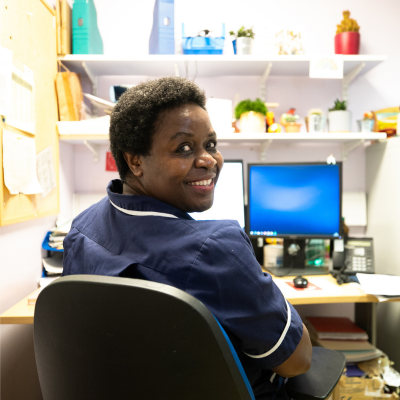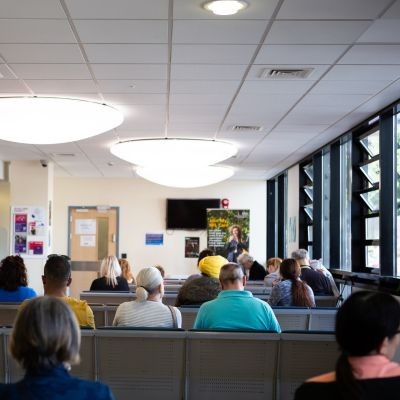
At the Royal Free London, we are proud to be part of a diverse patient and staff community, which brings with it a richness of cultures, lifestyles and experiences.
We want people to feel welcomed to our trust, as patients, visitors or colleagues, and we are committed to providing services and a staff experience that is fair, accessible, safe and caring.
We recognise everyone is different with different needs, and we do not discriminate on the grounds of age, race, disability, marital status, gender of gender reassignment, religion or belief, sexual orientation, maternity or paternity or trade union membership.
As an organisation, we provide training to staff to raise awareness of diversity so they can understand and provide inclusive services to the communities we care for.
We also actively engage with our stakeholders and are working with our partners across north central London to reduce health inequalities and ensure inclusivity.
Our Equality, Diversity and Inclusion Framework 2021-2024 is aligned to our trust objectives and national policies, aiming by 2024 to have:
- inclusive accessibility and engagement
- inclusive and compassionate culture
- inclusive systems and policies
- inclusive leadership and accountability
The Equality Act 2010 requires our decision-making processes to:
- Eliminate unlawful discrimination.
- Advance equality of opportunity between people who share a relevant protected characteristic and people who do not share it.
- Foster good relations between people who share a relevant protected characteristic and those who do not share it.
We use equality analysis to understand the effect of our policies, practices, functions, business cases, projects and service changes.
Our specific equality duties requirements
The specific equality duties require the trust to:
- Publish annual equality information to show how we comply with our equality obligations. Our equality information is published on this website.
- Publish one or more equality objectives at least once every four years. Our current equality objectives are detailed in our Equality, Diversity and Inclusion Framework: 2021-2024.
We also use the NHS Equality Delivery System (EDS) improvement tool to assess our performance on equality and shape future action. View our EDS reports.
The Equality Act 2010 protects people against unlawful discrimination in their use of services and employment on the grounds of nine protected characteristics. These are:
- age
- disability
- gender reassignment
- marriage and civil partnership (in employment only)
- pregnancy and maternity
- race (this includes ethnic or national origin, or nationality)
- religion or belief
- sex
- sexual orientation
This means the following behaviour is unlawful:
- Direct discrimination. This is when an individual with a protected characteristic is treated in a worse manner because of that protected characteristic.
- Direct discrimination by perception. This means treating one person less favourably than someone else, because you incorrectly think they have a protected characteristic.
- Direct discrimination by association. This means treating a person worse because of the protected characteristic of someone they know or are associated with, such as a family member.
- Victimisation. This is when someone is treated unfavourably because they have complained, or spoken up about an issue relating to the Equality Act 2010.
- Harassment. This is unwanted behaviour related to a protected characteristic which has the purpose or effect of violating someone’s dignity or which creates a hostile, degrading, humiliating or offensive environment.
- Direct discrimination arising from disability. This means treating a disabled person unfavourably because of something connected with their disability when this cannot be objectively justified.
- Failing to make reasonable adjustments for disabled people is also a form of discrimination. A reasonable adjustment aims to make sure a disabled person can use our services as close as it is reasonably possible to get to the standard usually offered to non-disabled people. There are three requirements for reasonable adjustments:
- Making a change to the way things are done or in a service policy, criterion or practice.
- Making a change to the physical features of our premises.
- Providing an extra aid such as equipment or a different or additional service.
Objective justification
It is legal to justify certain types of indirect discrimination, direct age discrimination or discrimination arising from disability if this treatment or practice is a proportionate means of achieving a legitimate aim.
To achieve this, we must be able to justify two things:
- The purpose of treatment or policy must be for a real need and good reason.
- The means of achieving this purpose must be proportionate and we must minimise any discrimination as much as possible.
We have a legal requirement to comply with NHS England’s Accessible Information Standard (AIS).
This is to ensure we take a consistent approach to meeting the communication and information needs of disabled patients and carers who require support or adaptations to the way we communicate with them.
There are five important steps which we must take to deliver this standard correctly. We must:
- Ask patients and carers if they have any communication needs or need to be given information in a certain way.
- Make sure patients’ and carers’ communication or information needs are recorded accurately and in a way that is easy for staff to understand how to respond.
- Make it easy for staff to see when a person has information or communication needs and how those needs can be met. This is so anyone who looks at their file can find this out.
- Share this information with other providers of NHS care and adult social care to help them understand and meet their communication and information needs. This should only happen if they are allowed to see it.
- Make sure patients and carers get information in a way they can access and understand. They should also get support with communication if they need it.
Our AIS policy sets out how we should respond to the communication and information support needs of disabled patients and carers.
You can find more information about the standard on the NHS England AIS website.
Interpreting support for patients and carers
We are committed to ensuring effective communication with patients, their relatives and carers, and for them to be able to fully participate in their care.
To achieve this, we provide interpreters for people who require communication support because they are deaf or if they do not speak English.
You can find information on how we do this on our interpreting and translation services page.
Staff networks
Our staff networks provide support and advice to colleagues, as well as sharing their insights into how we can improve services for patients and offer greater opportunities for staff.
We currently have the following staff networks:
- BAME – for black, Asian and ethnic minority staff
- Ability@theFree – for staff with long-term conditions or disabilities
- Women’s Network
- Flourish@theFree – for colleagues in bands 1 to 5
- LGBT+ & Friends
The Royal Free London is also a forces-friendly employer and holds a Ministry of Defence Gold Employer Recognition Scheme award and Veteran Aware status from the Veterans Covenant Healthcare Alliance.
We are committed to ensuring the armed forces community do not face disadvantages and raise awareness of the additional healthcare support they may need, such as establishing links to appropriate nearby veteran services, including mental health care, and appointing two veterans’ champions within the trust.
The champions are Lt Col Lucy Lamb (clinical) and Gary Tolometti (non-clinical). We are also a proud signatory of the Armed Forces Covenant.
Campaigns and initiatives
Our See ME First campaign promotes equality, diversity and inclusion and highlights our commitment to improving the experience of patients, families and staff from all communities.
Staff are invited to make a pledge and receive a See ME First badge or lanyard. Wearing a badge or lanyard shows that staff:
- Belong to an open, non-judgmental, and inclusive NHS organisation that treats all staff with dignity and respect.
- Uphold our trust’s values of being positively welcoming, actively respectful, clearly communicating and visibly reassuring.
- Listen to colleagues and speak up when necessary.
Freedom from Racism at the Free is an organisational development programme to improve the understanding of anti-racism in the workplace and how as a trust we can implement change in our day-to-day lives.
The trust has been a member of the Department of Work and Pension’s ‘Disability Confident’ scheme since 2016.
We are a level 2, Disability Confident Employer, which means we go the extra mile to make sure disabled people are given a fair chance when we are recruiting, and promote a culture where staff feel safe to share information about their disability of long-term health condition.
Please email rf-tr.
You can also contact the Equality Advisory and Support Service (EASS) for independent advice. This is a national service that gives free advice, information and guidance to individuals on equality, discrimination and human rights issues.
Its opening hours are 9am to 8pm Monday to Friday and 10am to 2pm Saturday. You can contact them by:
- Telephone: 0808 800 0082
- Textphone: 0808 800 0084
- Post: FREEPOST Equality Advisory Support Service FPN4431
 Translate
Translate



